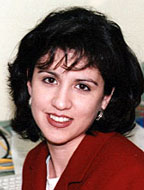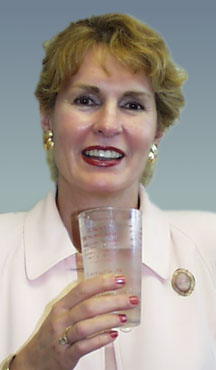
Prepared by
Diane Linder, EdD, LDN, RD

and
Melissa Brener, MS
Page 2 of 4
Most adult bodies are about 50-75%
water. This is equivalent to about 12 gallons of water.
|
|
Click here for the printable (Word) version of the lesson
How Much Water
Should You Drink?
 Sedentary adults need nine to
12 cups of water each day, but get at least six to eight to replace
daily body water losses. However, some of this water can be obtained
from foods because foods are 70-90% water. Individual water needs
vary, depending on the activities the person participates in
and other factors. Exercisers, especially those who exercise
in hot, humid weather, can lose up to a quart of water per hour.
They need more water than non-exercisers. Other groups of people
with increased fluid needs include: Sedentary adults need nine to
12 cups of water each day, but get at least six to eight to replace
daily body water losses. However, some of this water can be obtained
from foods because foods are 70-90% water. Individual water needs
vary, depending on the activities the person participates in
and other factors. Exercisers, especially those who exercise
in hot, humid weather, can lose up to a quart of water per hour.
They need more water than non-exercisers. Other groups of people
with increased fluid needs include:
- Infants.
- Pregnant and lactating women.
- Elderly – The elderly can have a reduced sense of thirst
and a reduced ability to conserve body water. Therefore, it is
important to encourage water consumption.
- People with diarrhea or vomiting – These illnesses can
cause dehydration, so it is important to increase fluid intake
during these times.
- People with fever – When body temperatures are elevated,
extra fluid is lost and must be replaced.
- Athletes or people doing hard physical labor.
- Air travelers.
- People on high-protein or high-fiber diets – Extra water
is needed to help digest and absorb these nutrients.
How
to Get Enough Water - Tips to Try
1. Keep a glass or bottle of water with you during the
day so you can sip from it often. When you travel, bring
your water bottle along!
2. Start some of your meals with soup. Soup provides
plenty of fluid and can also help you curb your appetite if you're
trying to lose weight. Be careful of the sodium levels
in canned soups though! If you are on a low-salt diet,
choose soups that are lower in sodium.
3. Drink more water, milk and juices and fewer soft
drinks.
4. Drink especially when you feel thirsty and even when
you don't feel thirsty! When exercising or doing other hard physical
labor, drink some water every 15-20 minutes, even if you're not
thirsty.
5. Increase your fluid intake if your diet is high in
fiber, protein or salt.
   [ LESSONS || SITE
MAP || LOCAL AGENTS || RESOURCES || PEOPLE ]
[ LESSONS || SITE
MAP || LOCAL AGENTS || RESOURCES || PEOPLE ]
Issued in furtherance of Cooperative Extension
work, Acts of Congress of May 8 and June 30, 1914, in cooperation with the United States
Department of Agriculture. The Louisiana Cooperative Extension Service provides equal
opportunities in programs and employment. Information and Graphics on this site are
copyright protected by LSU Agricultural Center's Louisiana Cooperative Extension Services. For more information on the EFNEP program, contact EFNEPMail@agcenter.lsu.edu.
|